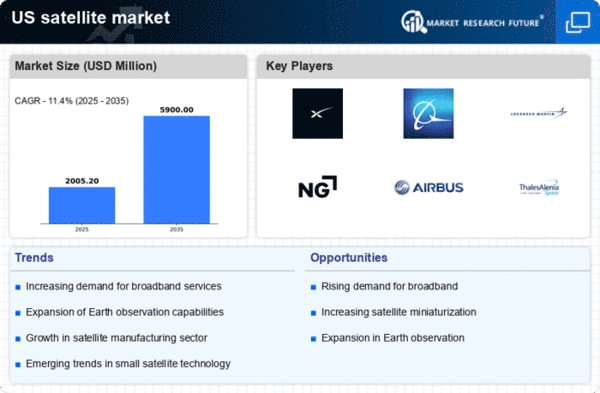Increased Investment in Space Exploration
Investment in space exploration is significantly impacting the satellite market, as both government and private entities allocate substantial resources to develop new satellite technologies. The U.S. government has earmarked billions of dollars for initiatives aimed at enhancing satellite capabilities for national security and scientific research. This influx of funding is likely to stimulate innovation within the satellite market, fostering the development of advanced satellites that can support a variety of missions, from climate monitoring to deep space exploration. The competitive landscape is expected to evolve as new players enter the market, driven by these investments.
Emerging Applications in Earth Observation
The satellite market is witnessing a notable expansion in applications related to earth observation. As environmental concerns grow, the demand for satellite imagery and data analytics is increasing among governments and private organizations. These applications are crucial for monitoring climate change, urban development, and natural disasters. The market for earth observation satellites is projected to grow at a CAGR of 6% through 2025, indicating a robust interest in utilizing satellite technology for sustainable development. This trend is likely to enhance the overall value proposition of the satellite market, attracting further investment and innovation.
Growing Demand for Satellite-Based Services
The demand for satellite-based services is on the rise, driven by the increasing need for connectivity and data transmission across various sectors. Industries such as telecommunications, agriculture, and disaster management are increasingly relying on satellite technology for real-time data and communication. In 2025, the satellite market is projected to reach a valuation of approximately $300 billion, reflecting a compound annual growth rate (CAGR) of around 5%. This growth is indicative of the expanding applications of satellite technology, which are becoming integral to modern infrastructure and services, thereby propelling the market forward.
Regulatory Support for Satellite Operations
Regulatory frameworks are evolving to support the growth of the satellite market, facilitating smoother operations and encouraging new entrants. The Federal Communications Commission (FCC) has implemented policies aimed at streamlining the licensing process for satellite operators, which could potentially reduce barriers to entry. This regulatory support is essential for fostering innovation and competition within the market. As more companies enter the satellite market, the diversity of services and technologies is expected to increase, ultimately benefiting consumers and businesses alike.
Technological Advancements in Satellite Manufacturing
The satellite market is experiencing a surge in technological advancements that enhance satellite manufacturing processes. Innovations such as 3D printing and modular designs are reducing production costs and timeframes. For instance, the integration of artificial intelligence in satellite design and testing is streamlining operations, potentially leading to a 20% reduction in development time. These advancements not only improve efficiency but also enable the production of more sophisticated satellites, which can cater to diverse applications such as telecommunications and earth observation. As a result, the satellite market is likely to witness increased competition and a broader range of services offered to consumers.

















